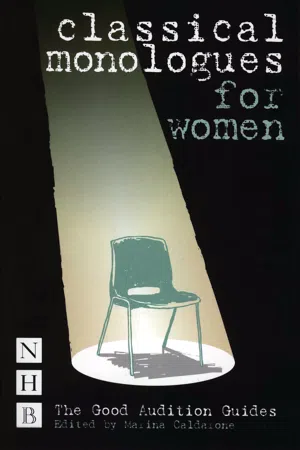
- 160 pages
- English
- ePUB (mobile friendly)
- Available on iOS & Android
Classical Monologues for Women
About This Book
The Good Audition Guides: Helping you select and perform the audition piece that is best suited to your performing skills
Each Good Audition Guide contains a range of fresh monologues, all prefaced with a summary of the vital information you need to place the piece in context and to perform it to maximum effect in your own unique way.
Each volume also carries a user-friendly introduction on the whole process of auditioning.
Classical Monologues for Men contains 50 monologues drawn from classical plays throughout the ages and ranging across all of Western Theatre:
- Classical Greek and Roman
- Elizabethan and Jacobean
- French and Spanish Golden Age
- Restoration and Eighteenth Century
- Nineteenth and Early Twentieth Centuries
'sound practical advice for anyone attending an audition... so many of these extracts simply cry out to be performed... a source of inspiration for teachers and students alike... a must' Teaching Drama
Frequently asked questions
Information
after Sophocles and Euripides (5th century BC)
Shakespeare (1593)
(1595)
by Thomas Middleton (1605)
by Thomas Middleton and William Rowley (1622)
by Philip Massinger (1625)
Table of contents
- Cover
- Title Page
- Contents
- Introduction
- Classical Greek and Roman
- Electra from Electra by Sophocles (c. 415 BC)
- Polyxena from Hecuba by Euripides (c. 424 BC)
- Creusa from Ion by Euripides (c. 413 BC)
- Ismene from Thebans by Liz Lochhead (2003), after Sophocles and Euripides (5th century BC)
- Palaestra from Rudens by Plautus (c. 200 BC)
- Elizabethan and Jacobean
- Alice Arden from Arden of Faversham by Anon (1592)
- Margaret of Anjou from Henry VI, Part 3 by William Shakespeare (1592)
- Countess of Salisbury from Edward III by William Shakespeare (1593)
- Julia from The Two Gentlemen of Verona by William Shakespeare (1593)
- Lady Anne from Richard III by William Shakespeare (1594)
- Adriana from The Comedy of Errors by William Shakespeare (1595)
- Lady Constance from King John by William Shakespeare (1596)
- Tamyra from Bussy D’Ambois by George Chapman (1604)
- Bellafront from The Honest Whore by Thomas Dekker (1604)
- Beatrice from The Dutch Courtesan by John Marston (1604)
- Crispinella from The Dutch Courtesan by John Marston (1604)
- Mother from A Mad World, My Masters by Thomas Middleton (1605)
- Lucretia Borgia from The Devil’s Charter by Barnabe Barnes (1607)
- Hermione from The Winter’s Tale by William Shakespeare (1610)
- Maria from The Tamer Tamed by John Fletcher (1611)
- Guiomar from The Custom of the Country by John Fletcher (1619)
- Hippolyta from The Custom of the Country by John Fletcher (1619)
- Beatrice from The Changeling by Thomas Middleton and William Rowley (1622)
- Leonora from The Devil’s Law-Case by John Webster (1623)
- Lady Alworth from A New Way to Pay Old Debts by Philip Massinger (1625)
- French and Spanish Golden Age
- Casilda from Peribanez by Lope de Vega (c. 1605-12)
- Célimène from The Misanthrope by Molière (1666)
- Henriette from The Learned Ladies by Molière (1672)
- Phedra from Phedra by Jean Racine (1677)
- Restoration and Eighteenth Century
- Margery from The Country Wife by William Wycherley (1675)
- Charlotte from She Ventures, and He Wins by Ariadne (1695)
- Bassima from The Royal Mischief by Delariviere Manley (1696)
- Lamira from The Fatal Friendship by Catherine Trotter (1698)
- Jane from The Tragedy of Jane Shore by Nicholas Rowe (1714)
- Millwood from The London Merchant by George Lillo (1731)
- Miss Stirling from The Clandestine Marriage by David Garrick/George Coleman (1766)
- Lydia Languish from The Rivals by Richard Brinsley Sheridan (1775)
- Julia from The Rivals by Richard Brinsley Sheridan (1775)
- Mrs Dangle from The Critic by Richard Brinsley Sheridan (1779)
- Nineteenth and Early Twentieth Centuries
- Mrs Tiffany from Fashion, or Life in New York by Anna Cora Mowatt (1845)
- Mrs Alving from Ghosts by Henrik Ibsen (1881)
- Miss Julie from Miss Julie by August Strindberg (1888)
- Madame X from The Stronger by August Strindberg (1889)
- Jean from Alan’s Wife by Florence Bell and Elizabeth Robins (1893)
- Mrs Cheveley from An Ideal Husband by Oscar Wilde (1895)
- Yelena from Uncle Vanya by Anton Chekhov (1897)
- Alice from The Dance of Death, Part Two by August Strindberg (1901)
- Margaret from Fanny’s First Play by George Bernard Shaw (1911)
- Orinthia from The Apple Cart by George Bernard Shaw (1929)
- Bride from Blood Wedding by Federico García Lorca (1933)
- Acknowledgements and Thanks
- About the Author
- Copyright Information